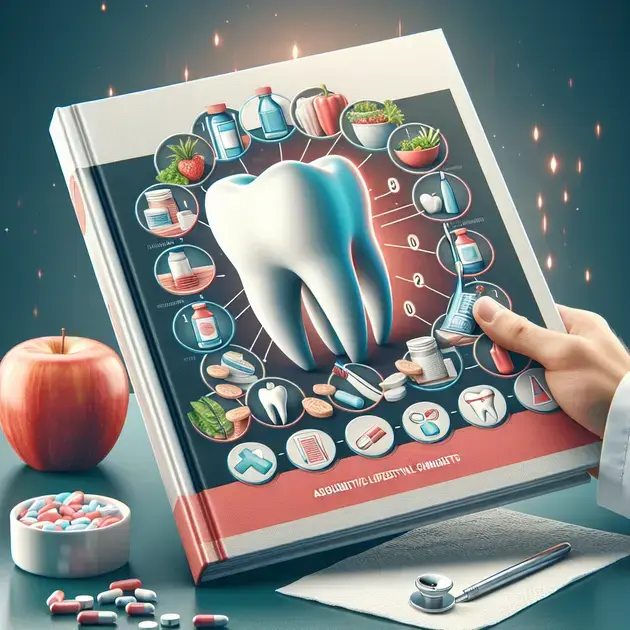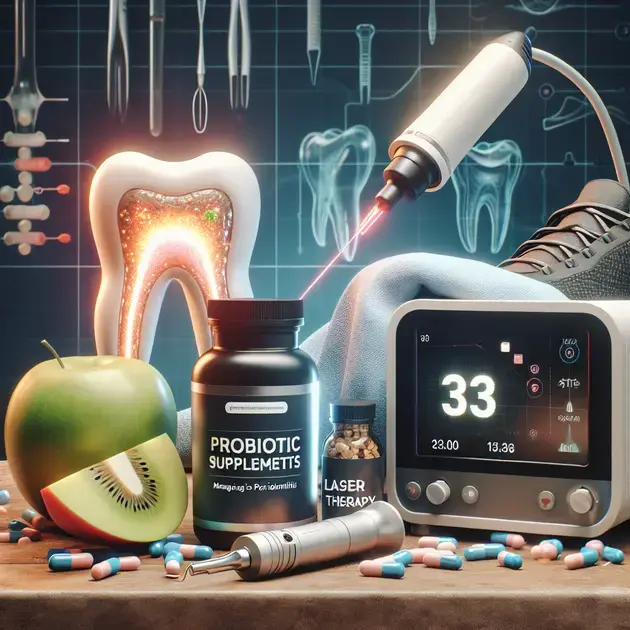Are you searching for effective medication for periodontitis? Look no further! In this comprehensive guide, we will explore the latest advancements in periodontal treatment and provide you with valuable insights on how to manage this common dental condition.
Periodontitis, a severe form of gum disease, affects millions of people worldwide. Through this guide, you will learn about the different types of medications available for treating periodontitis and discover which ones are the most effective in combating this oral health issue.

Effective Medication Options for Periodontitis
Periodontitis is a severe gum infection that can lead to tooth loss if left untreated. Fortunately, there are several effective medication options available to help manage the condition. One popular medication is Arestin, which is an antibiotic powder that is placed directly into the pockets of the gums where bacteria are present. This helps to eliminate the bacteria and reduce inflammation in the gums. Information on how to use Arestin and its effectiveness can be found on the official website of the manufacturer.
Another common medication for periodontitis is PerioChip, which is a small chip that releases medication over time to kill bacteria in the gums. Instructions on how to insert PerioChip and its side effects can be found on reputable dental health websites. Chlorhexidine mouthwash is also often prescribed to help reduce bacteria in the mouth and promote gum healing. Details on where to purchase chlorhexidine mouthwash and how to use it can be found on various online pharmacy websites.
It is important to consult with a dentist or periodontist before starting any medication for periodontitis to ensure it is the right treatment plan for your specific condition. Additionally, regularly brushing and flossing, along with professional dental cleanings, are essential components of managing periodontitis.
Understanding Periodontitis Treatment
Treatment for periodontitis typically involves a combination of professional cleanings, medication, and good oral hygiene practices. Depending on the severity of the condition, a dentist may recommend scaling and root planing, which involves deep cleaning of the teeth and roots to remove bacteria and tartar buildup. Information on the procedure and its benefits can be found on reputable dental clinic websites.
In some cases, surgical intervention may be necessary to treat advanced periodontitis. Procedures such as flap surgery or bone grafting may be recommended to restore gum and bone health. Details on these surgical treatments and their outcomes can be found on medical websites and journals.
After undergoing treatment for periodontitis, it is important to maintain good oral hygiene habits to prevent the condition from recurring. This includes regular brushing and flossing, using antimicrobial mouthwash, and attending follow-up appointments with your dentist for monitoring and maintenance.
Tips for Managing Periodontitis Symptoms
Managing symptoms of periodontitis involves more than just taking medication and undergoing treatment. It also requires lifestyle changes and daily habits to promote gum health. One important tip is to quit smoking, as smoking can worsen gum disease and hinder treatment effectiveness. Resources on how to quit smoking and its benefits for oral health can be found on government health websites.
Eating a balanced diet rich in vitamins and minerals is also crucial for managing periodontitis symptoms. Foods high in sugar and starch can fuel bacteria growth in the mouth, so focusing on a diet that is low in sugar and high in nutrients can help support gum healing. Recipes and meal plans for a periodontitis-friendly diet can be found on nutrition websites.
Stress management techniques, such as meditation or yoga, can also play a role in managing periodontitis symptoms. Stress is linked to inflammatory conditions in the body, including gum disease, so finding ways to relax and reduce stress levels can benefit overall gum health. Information on stress management strategies and their impact on oral health can be found on wellness websites and forums.

Understanding Periodontitis Treatment
Periodontitis is a serious gum infection that damages the soft tissue and destroys the bone that supports your teeth. Understanding the treatment options for periodontitis is essential to prevent further dental complications. The main goal of periodontitis treatment is to thoroughly clean the pockets around teeth and prevent damage to surrounding bone. This can be achieved through professional dental cleanings, scaling and root planing, and in some cases, surgical procedures to repair damaged tissues.
One common treatment for periodontitis is scaling and root planing, a deep cleaning method that removes plaque and tartar from the root surfaces and smoothens the tooth roots to promote healing. Antibiotics may also be prescribed to control bacterial infections and reduce inflammation. In severe cases, surgery such as flap surgery or bone and tissue grafts may be necessary to repair damage and restore gum health.
It is important to follow your dentist’s recommendations for ongoing maintenance and regular check-ups to monitor the progress of your treatment. Good oral hygiene practices at home, such as brushing and flossing regularly, can also help prevent the recurrence of periodontitis.
By understanding the various treatment options available and following a comprehensive oral care routine, you can effectively manage and control periodontitis to maintain healthy gums and teeth.
Remember that early detection and treatment of periodontitis are key to preventing further damage and complications, so be sure to schedule regular dental visits to address any gum health concerns.
Tips for Managing Periodontitis Symptoms
Managing the symptoms of periodontitis is crucial for maintaining oral health and preventing the progression of the disease. Common symptoms of periodontitis include red, swollen gums, bad breath, and gum recession. To effectively manage these symptoms, it is important to follow a few key tips.
First and foremost, practicing good oral hygiene is essential. Brushing your teeth at least twice a day and flossing daily can help remove plaque and prevent the buildup of tartar that can contribute to gum disease. Using an antiseptic mouthwash can also help kill bacteria and reduce inflammation in the gums.
In addition to good oral hygiene practices, maintaining a healthy lifestyle can also impact the symptoms of periodontitis. Eating a balanced diet rich in vitamins and nutrients can support overall gum health and boost the immune system. Avoiding tobacco products and limiting sugary foods and drinks can also help prevent further damage to the gums.
Regular visits to your dentist for professional cleanings and check-ups are crucial for monitoring the progression of periodontitis and addressing any symptoms early on. Your dentist may recommend additional treatments or interventions to manage the symptoms effectively.
By incorporating these tips into your daily routine and working closely with your dental care team, you can effectively manage the symptoms of periodontitis and improve your oral health in the long run.
The Impact of Lifestyle Changes on Periodontitis Progression and Treatment
Lifestyle changes play a significant role in the progression and treatment of periodontitis. Factors such as diet, smoking, stress, and overall health can all influence the development and severity of gum disease. Understanding how lifestyle changes can impact periodontitis is essential for effectively managing the condition.
Poor dietary choices, such as consuming sugary foods and drinks, can contribute to plaque buildup and bacterial growth in the mouth, increasing the risk of gum disease. On the other hand, a diet rich in vitamins C and D, antioxidants, and omega-3 fatty acids can support gum health and reduce inflammation.
Smoking is a major risk factor for periodontitis, as it impairs blood flow to the gums and weakens the immune system’s response to infection. Quitting smoking can significantly improve the success of periodontitis treatment and reduce the risk of complications.
Chronic stress can also impact gum health, as it can lead to poorer oral hygiene habits and increased inflammation in the body. Finding healthy ways to manage stress, such as exercise, meditation, or therapy, can help reduce the impact of stress on periodontitis progression.
Overall, making positive lifestyle changes such as following a healthy diet, quitting smoking, and managing stress can have a significant impact on the progression and treatment of periodontitis. By addressing these factors and working closely with your dental care team, you can improve your oral health and prevent further damage to your gums and teeth.
Conclusion
In conclusion, understanding periodontitis treatment is crucial for maintaining oral health and preventing further complications. Treatment options such as professional dental cleanings, scaling and root planing, and surgical procedures play a vital role in managing periodontitis effectively. By following a comprehensive oral care routine and working closely with your dental care team, you can control and prevent the progression of this serious gum infection.
Managing periodontitis symptoms requires a combination of good oral hygiene practices, healthy lifestyle choices, and regular visits to the dentist. By brushing and flossing daily, using antiseptic mouthwash, maintaining a balanced diet, and avoiding tobacco products, you can reduce inflammation and support gum health. Consulting with your dentist for professional cleanings and check-ups allows for early intervention and effective symptom management.
The impact of lifestyle changes on periodontitis progression cannot be overstated. Poor dietary choices, smoking, and chronic stress can exacerbate gum disease, while a healthy diet, quitting smoking, and stress management can significantly improve treatment outcomes. By addressing these lifestyle factors and collaborating with your dental care team, you can enhance your oral health and prevent further damage to your gums and teeth.



